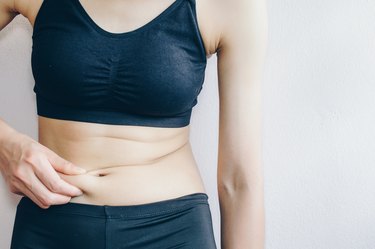
If you've been crushing it in the gym, but seeing minimal progress on your backside or stomach, you might be asking yourself, "how come I work out every day and still have cellulite?" While exercise can make a difference in the appearance, toning up doesn't always guarantee that it will go away.
Tip
If your cellulite looks worse after working out, don’t blame it on the weights or cardio machine. More than likely, what you’re seeing has more to do with dehydration than it does with exercise.
Video of the Day
What Is Cellulite?
The dimpled or bumpy skin you see on your stomach, thighs, hips and various parts of your backside including the buttocks is called cellulite. Board-certified dermatologist, Dr. Hadley King, MD, tells LIVESTRONG.com that cellulite occurs when fat deposits push through the connective tissue beneath the skin, which causes your skin to take on a bumpy or dimple-like appearance.
Video of the Day
Depending on the severity, the Mayo Clinic says cellulite is either very noticeable or only easy to see if you pinch your skin in the area you have cellulite. While not a serious medical condition that needs treatment, many people will actively seek ways to rid themselves of their cottage cheese thighs.
If you've been dealing with cellulite for any length of time, there's a good chance you've tried several methods to reduce the appearance or even get rid of it. But short of expert treatments, ridding yourself of cellulite for good is a lofty goal that many people never reach.
That said, participating in a daily exercise program that includes resistance training and aerobic exercise may help smooth out the skin and reduce the dimple-like appearance. Unfortunately, some people like to perpetuate the myth that exercises such as squats make cellulite worse, and therefore, end up blaming their workouts.
Read more: Can You Firm Sagging Skin Without Surgery
Appearance of Cellulite After Exercise
While some people may notice their cellulite more after working out, exercise is not the culprit. In fact, King says the hydration status of the dermis may be a factor in the appearance of cellulite after working out.
"If cellulite looks worse immediately following a workout, it could be due to dehydration, or it could be due to the temporary increase in muscle volume due to blood flow," explains King. She says this temporary increase in volume may cause more fat to expand into the dermis.
To help you stay hydrated, and possibly improve the appearance of your skin, the Academy of Nutrition and Dietetics recommends drinking fluids before, during and after exercise. Often times, if you wait until you feel dehydrated, it's too late, and your body will begin to show signs of dehydration. Since adequate hydration varies among individuals, pay attention to your body, and drink when thirsty.
Diet and Exercise for Cellulite
The American Academy of Dermatology (AAD) recommends diet and exercise as a non-invasive way to target cellulite, especially since extra weight can make cellulite more visible. While losing weight may not be the answer for everyone, some people notice a reduction in the cellulite they see after shedding some pounds. However, the AAD does point out that if you end up with loose skin as a result of losing weight, your cellulite may become more noticeable.
Additionally, King points out that while some studies report that exercise can improve the appearance of cellulite over time, even people who are fit and thin can still have cellulite because it's more about the structure of the connective tissue and the fat. "Skin laxity can increase after weight loss because of loss of volume of fat," says King. The resulting loose skin, says King, can exaggerate the appearance of cellulite.
The good news? By following a regular strength training program, you can increase lean muscle mass, decrease body fat and reduce the appearance of cellulite. To get started, set a goal to train the lower body with weights at least three times a week. Focus on exercises that target multiple muscle groups such as squats, lunges, deadlifts and step-ups.
When choosing your cardio, consider workouts that require your lower body to be engaged the entire time. Some good examples include running, cycling, elliptical machine, stair climbing and sprinting.